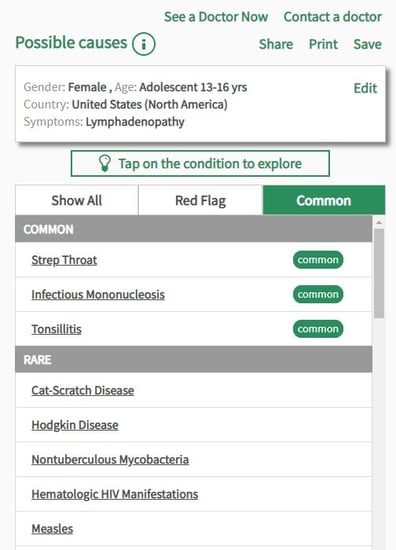- Privacy Policy
- Terms & Conditions
- Contact us
- ©Isabel Healthcare 2025
Swollen Lymph Nodes: Symptoms and Causes - Isabel Healthcare
Lymph glands (also known as lymph nodes) are pea-sized lumps of tissue which contain white blood cells. The white blood cells filter the lymphatic fluid through the body and protect you by destroying any viruses or bacteria that they find. They are an important part of the immune system and are found throughout the body.
How do I know if my lymph glands are swollen?
Normally, you cannot feel your lymph glands, but if an infection or disease is present then the lymph glands can swell to a few centimetres, becoming more prominent. Swollen glands caused by an infection is known as lymphadenitis. Swollen glands (lymphadenopathy) can be found in groups in various parts of the body including under the chin, on the neck, armpits or in the groin area. The site of the swollen lymph gland may help identify the cause of your illness as you may only have one aea of lymphdenopathy.
Other symptoms of lymphadenopathy include:
-
Tenderness or pain when you press on the lymph glands
-
Other signs of infection such as fever, sore throat
-
Red, warm swollen skin over the lymph node
-
A lump where the lymph gland sits
Swollen lymph nodes caused by infection or inflammation are soft, tender and can easily be moved when examined.
What are the causes of swollen glands?
Causes can be seen using Isabel’s symptom checker:

Strep throat / Tonsillitis: is caused by a bacterial infection and other symptoms include sudden fever, sore throat, headache and chills.
Infectious mononucleosis / Glandular fever: As well as lymphadenopathy, other characteristic symptoms are fever, fatigue, malaise and a sore throat.
Acute infectious laryngitis: Common alternative symptoms include loss of voice, hoarseness, dry throat and a dry cough.
Lung tuberculosis: Other symptoms are persistent coughing for several days, coughing up blood, fever, excessive sweating and chest pain.
Cat Scratch disease: This is a disease caused by the organism bartonella henselae. 40% of cats carry this bacteria in their saliva and it can be transmitted to humans via a cat scratch or a bite from a cat. Other symptoms include a bump or blister where the bite or scratch occurred, fatigue, headaches and low grade fever.
Toxoplasmosis: Flu like symptoms with high temperature, myalgia, tiredness and sore throat may also be present.
Viral infections such as the common cold can also cause swollen glands. Rarer causes also include some cancers including lymphomas, which originate in the lymphatic system where the lymph nodes sit, or leukemias, which originate in the bone marrow and lymphatic system.
When should I see my health care provider?
-
If the lump is hard, not mobile and does not cause pain then further evaluation should be sought from your health care provider
-
If the lumps have appeared for no reason
-
If the lumps continue to enlarge or have been present for over 2 weeks
-
If you have other signs of infection like night sweats, fever or unexplained weight loss
-
If you have a sore throat, have difficulty swallowing or breathing
Appointment preparation:
Take to the appointment with you the following information:
-
What symptoms you are experiencing
-
How long you have had the symptoms
-
Any recent travel abroad or exposure to ticks, animals, under cooked meat or high risk sexual behaviour with a new partner
-
List of medications and your key past medical history
Ask your doctor the following questions:
-
What’s causing my symptoms?
-
What tests do I need?
-
What treatment do I need?
-
Am I infectious, do I need to take any precautions to prevent infection to others?
-
When will I start to feel better?
-
Are they any complications I should look out for?
Further Tests:
If the health care provider feels after examining you that they cannot clearly say your swollen lymph glands are caused by a viral infection or a bacterial disease then they may refer you for further tests such as blood tests, chest x-ray or CT scan, or a lymph node biopsy.
What is the treatment of Swollen Glands?
Treatment is determined by the cause of the swollen glands. If the health care provider recommends self-care due to the cause being viral, then over the counter pain relievers such as Advil or Tylenol may helwith your symptoms. If the glands are painful applying a warm, wet compress to the area affected will help. Rest until your body recovers.
If the cause is found to be bacterial then you may be prescribed antibiotics and should take them as instructed.
Once the underlying disease has been treated then the glands will return to their normal size and the symptoms should disappear.
Take a look at our Isabel Symptom Checker and run your symptoms through it:

Mandy Tomlinson
Mandy has worked for Isabel Healthcare since 2000. Prior to this, she was a Senior Staff Nurse on the Pediatric Infectious disease ward and high dependency unit at one of London's top hospitals, St Mary’s in Paddington which is part of Imperial College Healthcare NHS Trust. Her experience in the healthcare industry for the past 33 years in both the UK and USA means she's a vital resource for our organization. Mandy currently lives and works in Scottsdale, Arizona.
Subscribe Here!
Recent Posts
Isabel DDx Companion with ChatGPT Integration - to help you diagnose even faster
At Isabel Healthcare, we’ve always been driven by one goal: to make clinical reasoning faster,..Virtual Triage: Do more questions lead to better patient outcomes?
One of the common misconceptions related to virtual triage / symptom checker tools is that the more..List Of Categories
- Differential Diagnosis Decision Support
- Differential diagnosis
- Symptom Checker
- Symptoms
- Medical Error
- Patient Disease Information
- Disease
- Clinical Decision Support
- Diagnostic Decision Support
- Isabel 1 Minute Read
- Diagnosis Error
- Diagnosis Skills Cases
- Healthcare Informatics
- Clinical Reasoning
- Evidence-based Medicine
- Medical Education
- Patient Engagement
- Symptom Triage
- Nurse Practitioner Education
- Nursing Decision Support
- Partnership
- Public Health
- COVID-19
- EHR
- Patient Empowerment
- Patient Safety
- rare disease

Start your FREE Trial today
Try the Isabel Pro DDx generator for 30-days - no payment card details required.




